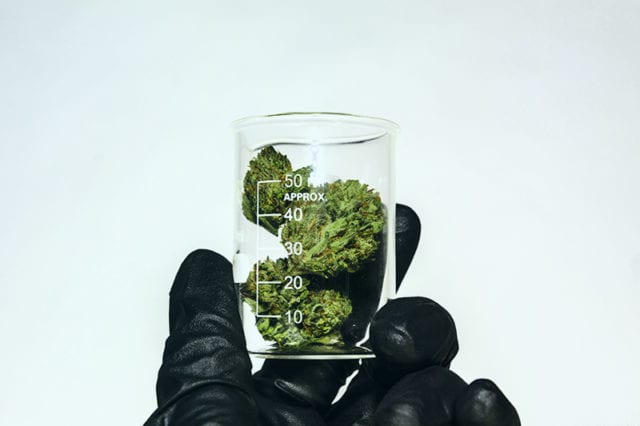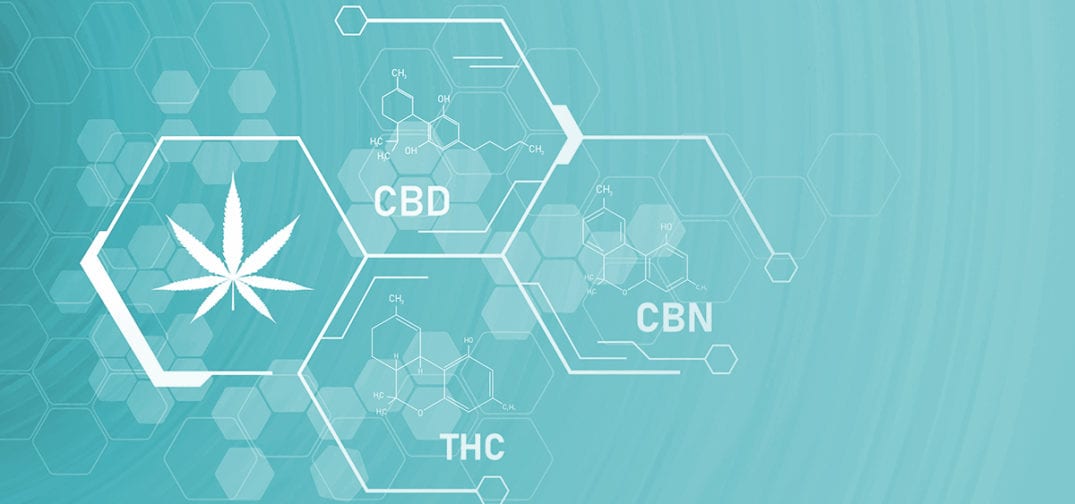When it comes to cannabis, there are hundreds of different cannabinoids and terpenes that produce the effects felt from consumption. Tetrahydrocannabinol (THC), the compound responsible for getting us high, and cannabidiol (CBD), a compound known for providing relief for certain physical and mental ailments, are the two major cannabinoids we are all most familiar with. As the industry evolves, however, so does the science, and with that comes a growing interest in the other minor cannabinoids and their potential effects. Why? Because if consumers can figure out precisely which chemicals they want in cannabis, growers and breeders will know which cannabis to give us.
Right now, one of the most sought-after cannabinoids is cannabinol (CBN), which is a compound believed to have many of the same benefits as CBD.
What is CBN?
Cannabinol (CBN) is a minor cannabinoid created as THCA degrades and oxidizes. It is actually the first cannabinoid ever discovered and isolated from cannabis. Though scientists have been aware of it since as early as the 19th century, the first thing you know about CBN is that there has never been enough research on the compound’s effects on the human body to come to any true conclusion. Most of the information we know about CBN derives from research on mice, and from there, researchers have formed educated guesses on how it may affect you and me. That said, here are some of CBN’s potential benefits:
CBN as a sedative/sleep aid
Currently, cannabinol is thought to be the sedative cannabinoid that makes us sleepy. We don’t know that for sure though. And in fact, there are studies that suggest it is not CBN alone that makes us sleepy, but CBN in combination with THC that sends us to bed. In a conversation with Leafly, Dr. Ethan Russo, who is credited with discovering the entourage effect, said that “Pure CBN is not particularly sedating, but it is typically found in aged cannabis in which the monoterpenoids have evaporated, leaving the more sedating oxygenated sesquiterpenoids.”
CBN as a pain reliever
Research has shown that cannabinol has potential analgesic properties that could help with the treatment of physical ailments like arthritis, migraines, nerve damage, inflammation, and even burns.
CBN as an antibiotic
In addition to being a sleep aid and pain reliever, cannabinol may have certain antimicrobial properties. A 2020 study suggests CBN could help combat MRSA. According to Mayo Clinic, Methicillin-resistant Staphylococcus aureus (MRSA) is an infection caused by a type of staph bacteria that’s become resistant to many of the antibiotics used to treat ordinary staph infections.
CBN as an anti-inflammatory
Cannabinol (CBN) may also have anti-inflammatory qualities. Studies have shown to decrease allergen-induced mucus production in mice, “indicating that cannabinoid-based compounds may represent a novel class of therapeutic agents for the treatment of allergic airway diseases.”
CBN as an anticonvulsant
Cannabis has been thought to provide relief for people that suffer from epileptic seizures. A study on CBN using mice suggests that CBN may be a powerful anticonvulsant, especially in conjunction with the other cannabinoids.
CBN as glaucoma therapy
Multiple studies have shown that cannabinol may help combat glaucoma. A scientific study in 1984 that tested the effects of CBN, as well as CBG, on cats. It concluded that cannabinol in high doses had a significant effect in reducing ocular tension, indicating that chronic administration of these cannabinoids lowers ocular tension considerably.
In addition to the treatments listed above, some studies have shown that CBN can be an appetite stimulant, can help with bone marrow growth, and can assist in the treatment of certain cancers. Still, there is much more clinical research needed on CBN as it relates to the human endocannabinoid system before we can come to any true conclusions.

Which cannabis strains and products are high in CBN?
If you’re seeking to explore the many potential benefits of CBN, unfortunately, there have not been many cannabis strains that have tested high in CBN. Multiple online sources suggest strains like Death Star, Animal Cookies, Kosher Kush may be high in cannabinol, but there still remains much research (and lab testing) before that can be confirmed. While it remains difficult to tell you which cannabis strains have CBN, many companies have created hemp-derived CBN now that the crop has been federally legalized.
With industrial hemp containing many of the same cannabinoids as cannabis sativa, processors are able to extract CBN from hemp plants and isolate the compound in oils. Because of this, you can find a plethora of oils, tinctures, topicals, vape pens, and even edibles that contain high concentrations of CBN. Should you choose to explore these products, make sure to only purchase from a reputable source who can provide lab testing data and a complete list of their products’ ingredients.
Get daily cannabis industry news and insights. Subscribe
End
